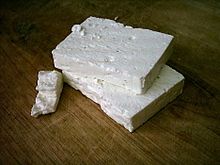Greek cuisine
Greek cuisine is the cuisine of Greece or perhaps of the Greeks. Given the geography and history of Greece, this style of cookery is typical of Mediterranean cuisine, with strong influences from Italy (notably Venetian and Sicilian), Middle East and, to a lesser extent, from the Balkans. The basic grain in Greece is wheat, though barley is also grown. Important vegetables include tomato, eggplant, potato, green beans, okra, and onions. The terrain has tended to favour the production of goats and sheep over cattle, and thus beef dishes tend to be a rarity by comparison. Fish dishes are also common, although today most of the fish is imported since the Aegean Sea is quite overfished. Olive oil, produced from the trees prominent throughout the region, adds to the distinctive taste of Greek food. Some dishes use filo pastry. Too much refinement is generally considered to be against the hearty spirit of the Greek cuisine. Traditionally, Greek dishes are served warm rather than hot.
Appetizers

Dips are served with loaf bread or pita bread. In some regions, dried bread ('paximadhi') is softened in water.
- Tzatziki, yoghurt with cucumber and garlic puree, used as a dip; it comes from the Turkish beverage or soup cacık.
- Taramosalata, fish roe pureed with boiled potatoes or moistened breadcrumbs; tarama = fish roe, salata = salad.
- Spanakopita, spinach wrapped in filo pastry.
- Tyropita, cheese (usually feta) wrapped in filo pastry.
- Many other things are wrapped in filo pastry, either in bite-size triangles or in large sheets: kotopita (chicken), spanakotyropita (spinach and cheese), hortopita (greens), kreatopita (meat pie, using ground meat), etc.
- Saganaki, fried cheese.
- Dolmades grapevine leaves stuffed either with meat or rice and vegetables. From the Turkish 'dolma' = 'stuffed'.
- Avgolemono soup, chicken, meat, vegetable, or fish broth thickened with eggs and lemons and rice.

- The so-called Greek Salad is known in Greece as Village/Country Salad (Horiatiki). In Greece, it consists of tomato, cucumber, onion, and sometimes green peppers garnished with olives and feta cheese, and dressed with olive oil and oregano. Abroad, it also sometimes includes lettuce (even iceberg lettuce!), which is completely unknown to the Greek version, and foreign to its genius.
- Pikilia simply means an 'assortment'.
Some dishes served in Greek restaurants (especially outside Greece) are not Greek at all, for example hummus bi tahini, the famous Lebanese dip.
Famous Greek dishes
- Moussaka (eggplant casserole). There are other variations besides eggplant, such as zucchini or rice, but the eggplant version ("melitzanes moussaka") is most popular, so "moussaka" alone is assumed to mean with eggplant.
- Kleftiko: lamb slow-baked on the bone, first marinated in garlic and lemon juice.
- Souvlaki, lamb and vegetables grilled on skewers, or in general, anything grilled on a skewer (chicken, swordfish).
- Gyros, meat roasted on a vertically turning spit and served with sauce (often tzatziki) and garnishes (tomato, onions) on pita bread; a popular fast food. Sometimes confused with souvlaki served in a similar way.
- Boureki, similar to kreatopita, from Turkish börek.
- Pastitsio, a macaroni, meat, and Bechamel sauce casserole.
Desserts

- Baklava, a popular sweet dessert, of filo pastry layers with nuts, sugar, honey, cloves. Related to the Turkish baklava, Lebanese baqlawa.
- Loukoumas (Turkish lokma)
- Loukoumia
- Yoghurt with honey
- Galaktoboureko, custard between layers of filo. From Turkish börek.
Drinks
- Wine is the most common drink in Greece. Until the 1980's, most wine in Greece was mediocre in quality at best, but more recently it has come up to international standards.
- Beer is widely drunk; common brands include Heineken, Amstel, Mythos, Henninger, and Kaiser, all of which are produced locally, some under license.
- Ouzo (an 80-proof clear alcoholic beverage that is flavored with anise; it turns milky white with water or ice; the best said to be produced on the island of Lesbos). It is similar to Turkish raki.
- Raki or Tsipouro (Mostly home-brewed, a clear drink similar to ouzo, often with higher alcohol content, and usually not flavored with herbs.
- Retsina (a white wine that has some pine tar added, originally as a preservative, but nowadays for the flavor; this is an Athens region specialty. It should not be aged.).
- Mavrodafni Sweet, liquor-style, red wine with higher alcohol percentage than normal.
- Metaxa, a brand of sweet brandy, 40% alcohol content.
- Greek coffee, also known as 'Turkish coffee' is made by boiling finely-ground coffee beans, and is served thick and strong, and often sweetened.
